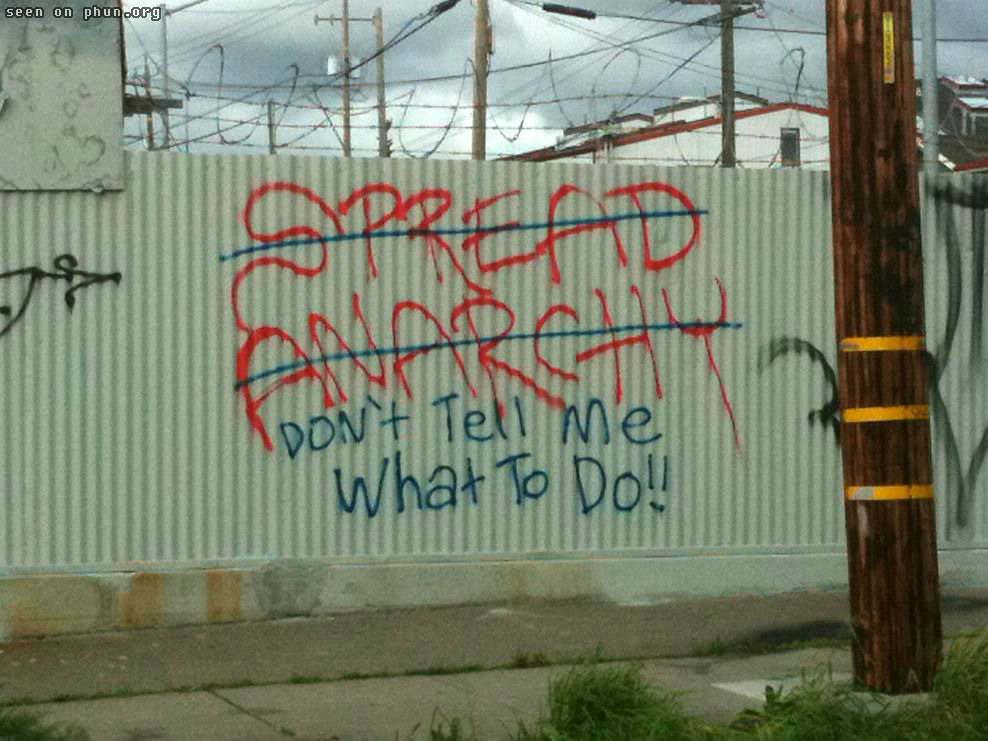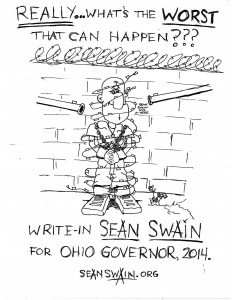by Sean Swain
Several years ago I was invited to participate in a debate between Socialists Tom Big Warrior and Rashid Johnson of the Black Panther Prison Chapter, on one hand, and Anthony Rayson, a prolific zinester, and myself for Anarchism, on the other hand. Much to my disappointment, the project fell through and I spent years seeking a public forum for my arguments, the problem being Anarchist publications willing to publish would never give me an argument, and Socialist publications bristled at publishing anti-Socialist views.
What follows is one view that the traditionally Socialist concept of “revolution” which maintains the existence of the State is not revolution at all, and that only the complete abolition of the State–a decidedly Anarchist engagement–constitutes a true revolution. The implication, then, is that Socialism represents only a more-developed and somewhat-disguised expression of reformism, making Socialism itself an agency of counter-revolution.
Reform Versus Revolution
We have to proceed keeping in mind that those who assume the right to rule us are very good at hijacking language. Whenever threatened by a concept, they neutralize the danger by stealing the word. Take, for instance, “revolution.” Lacking any true capacity to offer a counter-idea that compares, to defeat revolution, those who assume the right to rule us redefine the word “revolution,” applying it to everything. We now have “revolutionary” new formulas for dish-soap and “revolutionary” technologies, and we have a corporate network producing prime-time entertainment called, “Revolution.” The idea is, if they can make the word ubiquitous, reproduce it everywhere, the word means everything and nothing at the same time. So, the word that appropriately means liberation from oppressive forces of external regulation is reduced to an adjective describing the flavor of a new burrito offered by a corporate fast-food profiteer.1
The global colonizer’s pervasive abuse of language as a counter-revolutionary strategy means we have to be clear in our use of words. So, regarding revolution, we’re not talking about new fashions but about an orientation that rejects reform in favor of abolishing the existing system to create something new. So, in contrasting reform and revolution, we’re speaking of one perspective, reform, where there exists a continuity, an unbroken progression, and another perspective, revolution, that advocates a complete disjuncture, a break whereby the old system ceases to exist and something totally new emerges in its absence.
Safe to say, Socialists view themselves as revolutionaries,2 advocating a revolutionary disjuncture, toppling the existing system and bringing about Socialism in its place, which Socialists view as totally new and distinguishable from what preceded it.
The problem is, careful analysis reveals that “Socialist revolution” is not revolutionary at all. “Socialist revolution” does not create a distinct disjuncture, does not topple existing systems for something “totally new.”
Three historical examples–Russia, China, and Cuba–provide examples of the non-revolutionary character of Socialism.
Beginning with the celebrated Russian Revolution, the Bolsheviks deposed the Tsar…and Lenin moved into the Tsar’s Winter Palace…and created a more powerful, more centralized authority with a greater capacity to oppress than the Tsar ever imagined. Under the Tsar, there were prisons and there were struggling workers and peasants. Under Socialism, there were more prisons and there were more struggling workers and peasants. As Nikolai Bukharin presented it:
“From a broader point of view, that is the point of view of an historical scale of greater scope, proletarian compulsion in all its forms, from executions to compulsory labor, constitutes, as paradoxical as this may sound, a method of the formation of a new Communist humanity from the human material of the capitalist epoch.” (Emphasis added.)
To this bewildering sentiment, Lenin wrote, “Precisely,” in the margin. Compulsion, executions, slavery, reducing humans to “material”–none of that is “revolutionary.” The historical event of Lenin replacing the Tsar and introducing a new vocabulary to describe the old oppression, a Socialist describes as a “revolution.” But in the U.S.–the most imperialist colonial power in the world–old tyrants are routinely replaced by new ones with a new vocabulary to describe the old reality. Reagan-Bush was replaced by Clinton, Clinton by Bush II, Bush II by Obama. If replacing one tyrant with another with a new lexicon constitutes “revolution,” then every U.S. election is a Socialist “revolution” equivalent to Lenin assuming power in Russia…and we’re back to the word “revolution” being meaningless.3 If you put a goatee on the Monopoly Man and call him “comrade,” that doesn’t stop him from exploiting you when you land on Boardwalk (even if he changes its name to “Leningrad”).
The Chinese Revolution proves the same pattern. All of Mao’s declarations to the contrary notwithstanding, the donkey never plowed the field “for the good of the People.” The donkey plowed the field under the weight of the yoke on its neck, under the threat of the lash on its back, and under the terror of starvation if it refused.
Before the revolution, the Chinese people had a small group of tyrants running their lives and doing it badly. After the revolution, the Chinese people had a small group of tyrants running their lives and doing it badly. That sounds like continuity, not disjuncture.
Still, there’s Cuba, right? Unlike Russia and China, Cuba did not abandon Socialism in favor of some free-market hybrid monstrosity that comes from breeding capitalism with Marxism. Does Cuba qualify as a “disjuncture?” Well, if old, privileged, male homophobes exercising despotic power and legislating against diversity qualifies as “revolutionary,” then the equivalent of the Cuban “revolution” can be watched right now on CSPAN.4
One could argue of course that the conditions of life for the average Cuban are much better under the Castro regime(s) than under Fulgencio Batista’s dictatorship–and this is certainly true: Cuba has the highest literarcy rate in the Western Hemisphere, more doctors per capital than any nation in the world, and a homelessness rate of virtually 0%. But, this is also irrelevant, as life for the average U.S. citizen was far more comfortable under Clinton-Gore than under Reagan-Bush, but this does not qualify Clinton’s reformist election as a revolutionary disjuncture. Also, such an argument opens the door for other comparisons: If the standard of living in capitalist Belgium is higher than in Socialist Cuba, does that make Belgium’s regime more “revolutionarily disjunctive” than Cuba’s? If so, then Silvio Berlusconi of Italy–a pseudo-fascist–was more “Socialist” than Hugo Chavez, by virtue of inheriting a decent economic situation.
Socialism as Reformism
In every example of Socialist “revolution,” the underlying continuity–the maintenance of a central State–far and away overshadows any minor and inconsequential “disjunctures” represented by any changes in the character of that State. From this view, Socialism–and any Statist effort, really–can be understood as revolution’s “underachiever,” aspiring to replace a meaner tyrant with a seemingly-nicer one, rather than abolishing tyranny completely.
As a consequence, history proves Socialism over the long haul gets stuck in the same rut as reformism–a cycle of so-called liberatory change that is later negated by counter-revolutionary shifts. The Socialist cycle of change and reversal is just longer and slower than the same cycle that is experienced by those consciously engaged in reform. The Who summed it up best: “Meet the new boss; same as the old boss…”
For a real revolution, a true disjuncture, it is not enough to replace the old boss with a new boss. Eliminating the position entirely is a revolutionary disjuncture. Anything less is reformist continuity with a reformist end result.
Socialism’s Principle Delusion
Socialism does not conceive of a state-less society, but sees the State as a permanent, necessary fixture that can neither be abandoned nor abolished. In this way, the State is a common denominator for Socialists and Fascists alike–while they occupy opposite ends of a political spectrum, they both advocate the continuity of the State and differ only in how they perceive that State should operate.
At root, Socialists believe the State can be seized and employed as a force for revolution, for liberating people from the oppression of external regulation. This false belief in the State as a possible force for liberation is provably delusional. This is demonstrable through a reasoned analysis of the State and its function as related to human freedom.
Freedom
Before we can draw any conclusion about the character of the State, whether it can or cannot function as a mechanism to liberate (i.e., increase freedom) rather than oppress (i.e., increase non-freedom), we must again define our terms. “Freedom,” like “revolution,” can have too many meanings. I propose we use a definition put forward by Ward Churchill as an excellent working definition: “The absence of external regulation.” I like that. In the absence of external regulation, you are free. You have no external regulator, no boss, no sheriff, no ruler, nothing beyong you exercising power to govern you. You experience freedom–the absence of external regulation.
Also, conversely, in the presence of external regulation, you are un-free; that is, you are subject to some external regulator, and the more subject to external regulation that you are, the less free you are.
So, by this conception of things, we can imagine a kind of sliding scale represented by a horizontal line. At one end of the line we have a point we can label, “Absolute Freedom,” and at the other end, we have a point called, “Absolute External Regulation.”
ABSOLUTE FREEDOM •——————————————————————————• ABSOLUTE EXTERNAL REGULATION
Every position on the line between these two points then represents some interplay, some compromise between these two opposites.
This graph can be useful for us in considering ideas like “liberation” and “oppression.” Liberation, which is generally understood as the struggle to move the existing reality in the direction of freedom, on our graph would represent a shift leftward toward “Absolute Freedom.” It matters not where you are on the continuum, for our purposes, because if you struggle for liberation, for freedom, your destination is to the left. Conversely, if you want to oppress, to impose more external regulation, your destination is to the right of your current location. You want to move toward “Absolute External Regulation,” and away from “Absolute Freedom.”
ABSOLUTE FREEDOM •—————————————-|————————————-• ABSOLUTE OPPRESSION
←LIBERATION
→ REGULATION
The State
Let’s remember, the question posed to us is whether the State can be an instrument for liberation–that is, whether the State can move us from absolute external regulation and to absolute freedom. And we now have this graph for purposes of our analysis.
So, what is “the State?” What is the State’s relationship to the individual, the subject who finds herself or himself at some position on this continuum between absolute freedom and absolute external regulation? The State is authority. It is the purpose of a “government” to “govern.” It’s what they do.
To “govern” is to “regulate.”
The State’s relationship to the individual is one of “external regulation.” Whatever kind of State confronts us, and whatever regulation it conducts, the State’s very reason to exist is to regulate.
So now, when we look back at our continuum, the question for us is whether the State, the “external regulator,” the source of external regulation, can be an instrument for somehow eliminating the “external regulation” that provides the State its reason to exist. Worded another way, is it feasible that the State can be an instrument for standing up to the State?
Quite a paradox, using the State to protect people from the State, to use an “external regulator” to disempower itself, to conceive of a government whose aim is to not govern. This is particularly true when you consider that the individual’s struggle for liberation, struggle to move toward absolute freedom and away from external regulation, is the struggle against the external regulator.
It is the individual’s Struggle against the State.
Reasonably then, the Socialist strategy of using the State as an instrument to liberate people (from the State and its external regulation) makes about as much sense as putting a fire out with a can of gasoline and books of matches.
Socialism as “Fascism-Lite”
If we consider our continuum again, considering that we see the State as “external regulator,” we can recognize what the two extreme absolutes represent. At the left end, “Absolute Freedom,” we have also the absolute absence of external regulation. As the State externally regulates, the absence of external regulation corresponds to the absence of an external regulator, and therefore the absence of the State. So “Absolute Freedom” is also, necessarily, the absence of external regulation, the absence of the State.
Statelessness, absolute freedom, is called “Anarchism.” People who advocate statelessness are called “Anarchists.”
At the opposite end, we have an absence of freedom, we have absolute external control. A system where freedom is eliminated, where the State is supreme and all-powerful, is the totalitarian Stte. Fascism.
Anarchism is the antithesis to Fascism, and vice-versa. They are opposites.
It’s important to emphasize, only Anarchists inhabit the absolute freedom extreme. Only Fascists advocate the opposite extreme, the absolute absence of freedom.
So now, if we begin at that Fascist extreme, absolute external control, we can move, point by point, along the continuum, one step removed from Fascism, and then two. Moving in degrees to the left, sooner or later, we land on Socialism. Socialism then, as all Statist positions are, is a fixed number of degrees removed from Fascism. Unlike Anarchism, which is the exact antithesis to Fascism, Socialism manifests all of the necessary components of Fascism, but manifests them only to a lesser degree.5 In this regard, Socialism is not anti-Fascist, but is, instead, “Fascist-Lite.”
Revolution
The Fascist State is the absolute oppression. Every Statist position is some lesser degree of that absolute oppression, maintaining the external regulator with its external regulation and mitigating the absolute freedom represented by statelessness. In this way, all Statist positions, to include Socialism, are incapable of that necessary disjuncture of State abolition, and instead, by maintaining the State, maintain that dooming continuity, the State, that represents the revolutionary poverty of Statism.
Only Anarchism advocates the total disjuncture of State abolition. Only Anarchism represents the complete antithesis of Fascism and the external regulator which is the very source of oppression. This makes Anarchism, and Anarchism alone, the singular path for complete liberation.
Notes:
1. By this view, the implication is that before colonizing a geographic territory, those who impose themselves first colonize our minds by colonizing our language. Those who define (and re-define) our language exercise the power to shape our experiences and perceptions of our lives. Thus, oppression always begins with a mind-fuck.
2. Reformism is provably ineffectual. To use a familiar example, consider: many U.S. prison reformists lobby for furloughs, conjugal visits, and humane conditions, but the reality is all of those “reforms” once existed and were subsequently eliminated. Thus, all reforms are transient and temporary and can be (will be) undone by counter-reforms. Thus, reformism is delusional in its belief it can offer any permanent solution. So, by this view, even when reformism succeeds, all successes are temporary, thus all successes are inevitably long-term failures.
3. Lenin…Bush…the flavor of burritos…
4. Castro…McCain…the flavor of burritos…
5. This analysis is informative for understanding those historical situations like the Spanish Civil War, where Socialists and Anarchists united to oppose the Fascists, but in crucial turning points, the Socialists made key decisions to undermine and obstruct Anarchist, even to the ultimate victory of the Fascists. This account is conformed even by Socialists who fought on the revolutionary side. For the Anarchist perspective, Durruti, by Abel Paz; for the Socialist perspective, Homage to Catalonia, by George Orwell. In the final analysis, it seems, Statists stick together. Their commonality is State-worship.
***
Sean Swain is held hostage by a lawless rogue state calling itself the State of Ohio. Without a legal sentence or conviction, he will be liberated when the illegitimate power of this terror-state is abolished once and for all. Sean’s writings include, “Last Act of the Circus Animals,” “Freedom,” and “Ohio,” available for free at seanswain.org because capitalism sucks and no one should get paid for telling the truth. Sean supports arming the homeless, burning down banks and courthourses, and dismantling swivelization to build something better.
The State started the war…Sean Swain intends to finish it.
 From The Final Straw Radio.
From The Final Straw Radio.


 This originally aired on
This originally aired on  Transcript of Radio Essay originally appearing on
Transcript of Radio Essay originally appearing on  This is a transcript of an audio essay that originally aired on
This is a transcript of an audio essay that originally aired on  What is an anarchist engagement? I ask because I’m running for Ohio Governor in 2014 as a write in candidate from Ohio’s super-duper-uber-mega ultramax facility.
What is an anarchist engagement? I ask because I’m running for Ohio Governor in 2014 as a write in candidate from Ohio’s super-duper-uber-mega ultramax facility. Media Release
Media Release Pacifists Suck: How Arresting Revolution Maintains a Violent World
Pacifists Suck: How Arresting Revolution Maintains a Violent World